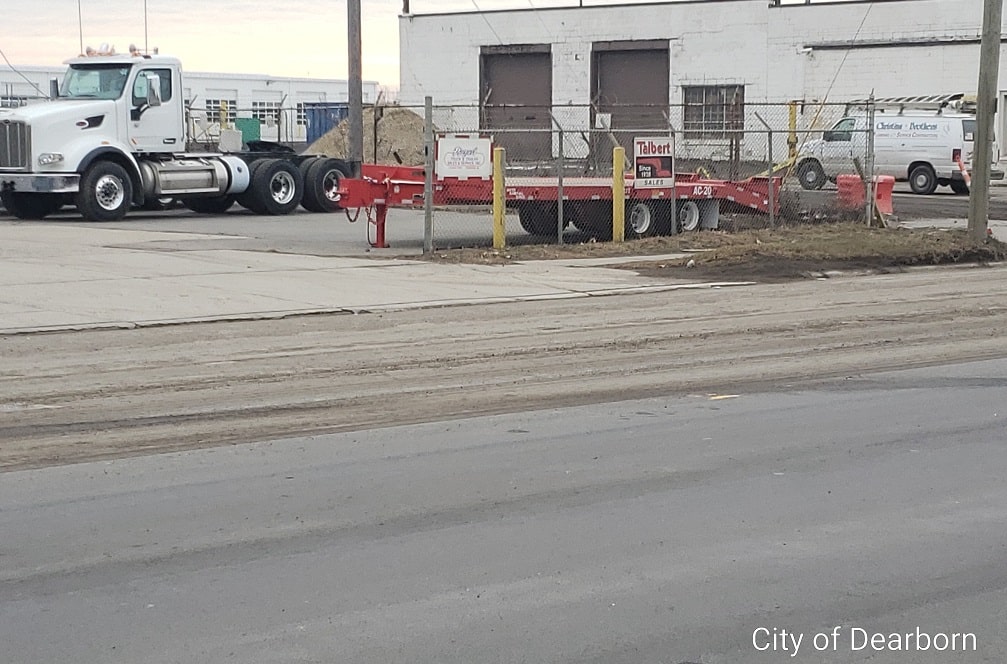This is an occasional series in which Planet Detroit examines how environmental ordinances are enforced in Metro Detroit.
After 18 months of deliberation, the City of Dearborn passed a first-of-its-kind local ordinance to regulate fugitive dust in the city this past summer.
Residents who sought protection against dust reported it caused haze, decreased visibility, and odors. The American Lung Association ranks the Detroit- Warren-Ann Arbor area as the 10th worst out of 204 metropolitan areas for year-round particulate pollution, which is linked to a number of health effects including heart attacks and increased asthma rates.
Susan Dabaja, Dearborn’s city council president, said it took the council a long time to pass the ordinance because of uncertainty over what the city could legally regulate and what they had the resources to enforce. The state, not local governments, typically handles such environmental issues, but Dabaja said the level of enforcement coming from the state was inadequate.
“Our residents just felt like they were not getting the relief they were looking for on the state level,” Dabaja told Planet Detroit.
Dearborn decided its best option was to include a fugitive dust enforcement under its nuisance code after consulting with experts.
The ordinance requires industrial truck trailers to be covered to prevent dust and debris from flying off in transit. To trigger enforcement, a resident must make a complaint. A city inspector then follows up and issues a violation notice to the offender, who has 14 days to respond with their plan to correct the situation.
Corrective actions could include creating rumble strips that help remove soil as trucks drive across them or installing tire wash stations. If the offending company does not respond to a citation within two weeks, it is issued a $500 ticket for the first offense and $1,000 tickets for all violations afterward.
Since the ordinance passed in August, Dearborn has received 16 complaints from residents submitted via email, phone, and text message. Some of the complaints included photos or videos. Of the 16 complaints, the city has issued nine tickets so far.
The scrapyard Pro V received 3 complaints, resulting in one ticket for repeated violations. Universal Truckload Service received 2 complaints, resulting in two tickets for noncompliance and repeated violations. Neither of these firms responded to Planet Detroit’s request for comment. Aggregate provider Levy was found in violation of “smoke/steam from vehicles,” and AK Steel was found in violation of “emission discharge.” Both companies remedied the problem so were not issued tickets. Other tickets were issued to Dearborn Industrial Center LLC and Ferrous Processing & Trading Company, both for “track out.”

Around 30 residents participated in study sessions as the council worked on the ordinance was developed. The ordinance was pared down from a proposed 21- page document to just a few pages during the process. Some advocates and community residents wanted stronger regulation than the new ordinance accomplishes.
Dearborn’s city inspector John Davidson is tasked with enforcing the city’s ordinance without proactive, routine inspection of businesses. As a result, mounds of bulk solids sitting at storage facilities may remain uncovered until a resident complains.
“My goal was to have bulk solids covered like Detroit’s ordinance does,” Samraa Luqman, a community resident who was involved in the ordinance process, told Planet Detroit.
Detroit’s ordinance, enacted in 2017, includes proactive enforcement in which inspectors visit businesses to enforce compliance. Dave Norwood, the sustainability coordinator with the Dearborn Mayor’s Office, told Planet Detroit that since “Detroit is a bigger city with more staff, expertise, resources, and knowledge base to draw upon for these types of issues,” it is better equipped to enforce a more robust ordinance than is Dearborn.
Uncovered piles of bulk solids are “the primary causes of particulate matter in our area,” according to Luqman. Particulate matter can cause a number of negative effects on the respiratory system, including worsened asthma, decreased lung function, and early death in those with heart or lung disease. Luqman’s son has elevated lead levels in his blood, and she believes a significant route of exposure was through breathing lead in particulate matter.
“It’s not because of the water, it’s not because of paint chips, not because of anything except the air,” she told Planet Detroit. Exposure to lead can cause behavioral changes, memory issues, general sickness, and increased brain and kidney damage risk.
“We’ve been failed federally, we’ve been failed statewide, we’ve been failed municipally,” she said.
Because the source of fugitive dust can be hard to trace, State Representative Abdullah Hammoud told Planet Detroit that he and others in the community advocate for a more proactive approach involving regular on-site inspections of facilities. But accomplishing that level of enforcement may be a challenge for Dearborn.
“Ultimately the state is still required to do their part.” Dabaja said.“We certainly don’t have the financial resources or the expertise that the state level does.”
Nick Assendelft, a media relations representative for the Michigan Department of Environment, Great Lakes, and Energy, told Planet Detroit that since the Dearborn ordinance draft was proposed a year and a half ago, “Nothing has changed in the way we enforce rules regarding fugitive dust air pollution as there have been no significant changes to the state and federal air pollution laws, regulations and rules which we enforce.”
Dearborn plans to issue quarterly reports to the public on violations and its enforcement of the ordinance. Dabaja said the city may tweak the ordinance as needed based on those findings.
Luqman and other community advocates plan to advocate for placing a stronger version of this ordinance at the forefront of their efforts to lobby Dearborn’s city council members and mayoral candidates for next year’s election.
Meanwhile, Hammoud is working on getting EGLE to consider environmental justice factors and cumulative impact when they’re issuing air permits.
“That would be the next big thing to help improve the quality in Dearborn,” he said.
Complaints can be filed by contacting the City of Dearborn at 313-943-2121 or 313-943-2688 or via email at fugitivedust@ci.dearborn.mi.us.

